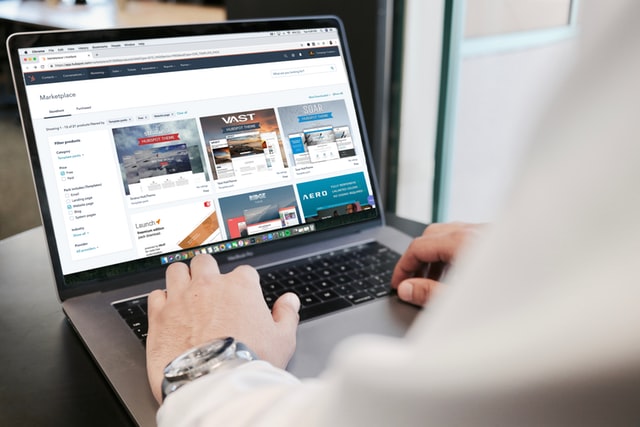Websites come in all sizes. From straightforward, single-page websites to robust e-commerce websites with dozens or hundreds of pages, there is no one-size-fits-all for web design. When you have a website with multiple pages, pagination intentionally organizes those pages to benefit the user experience.
What is Pagination, Exactly?
Think of browsing the website of your favorite retailer. When you click on a product category, dozens of thumbnail pictures represent different products. But, likely, the entire catalog won’t fit on a single page without endless scrolling. The typical presentation shows a handful of items with page numbers or arrow buttons towards the bottom to advance through additional product pages. Pagination is the arrangement of content across multiple pages to present a well-organized and manageable content selection.
Related: Beginners Guide to SEO
Why You Should Use Pagination
Pagination effectively organizes large amounts of content to improve the user experience. While your visitors want to see a large selection of merchandise or information, they don’t want to be bombarded or overwhelmed. Pagination helps e-commerce websites sell more products, and service-based websites secure more leads.

How Pagination Affects Search Engine Ranking
The word on the street is that users prefer single-page content. And that might lead some people to believe that paginated websites get dinged just for having multiple pages. Major search engines like Google says that isn’t true. But there are some things that some sites tend to do in conjunction with pagination that does hurt their rankings. Here is what to watch out for.
Overwhelming Search Bots
Search engines use bots to crawl and index all pages on every website to categorize and show them in relevant search results. Extensive, paginated websites overwhelm search bots, which results in ineffective crawling. Instead of essential indexing pages on the website, the search bots will follow paths dictated by the pagination, which hurts page ranking. The fix is prioritizing pages on paginated sites to tell search engines which pages should be crawled.
Waters Down Content Quality
Search engines reward websites with unique, thorough content on all web pages. As paginated sites add more pages, the content quality becomes considerably lower. It is ok to use pagination as long as you are not spreading too little content over too many pages. E-commerce websites can focus on providing high-quality product descriptions that meet word count targets to keep the amount of unique, high-quality content comparable to the number of web pages.
Related: Website Management Tips for Your Small Business
Creates Duplicate Content
Another penalty that is associated with low-quality websites is duplicate content. Many e-commerce websites make the mistake of duplicating product descriptions with only minor changes across hundreds of web pages. The fix for duplicate content strikes on paginated pages is to focus on variety in meta descriptions, H1 tags, anchor text, and CTA’s.
Diluted Ranking Signals
Another indicator that search engines use to assess a website’s street cred is how many high-authority domains link to it. The more pages a website contains, the more links it needs to impact ranking signals.
Mindspun Payments is the easiest, best way to sell subscriptions on your WordPress site using Stripe. Learn more about our products.
Examples of Paginated Pages
Pagination is well-utilized across the world wide web. From news websites and e-commerce to music or video services, many websites need to use pagination. On news websites, the most common example of pagination is story previews. You will often see the first paragraph or two of a story with an opt-in to finish the story.
Any website with a catalog for products, music, or movies is another example of pagination. How about a website builder service that features a catalog of templates? Category pages show a selection of templates with different page numbers or arrows at the bottom of the page to expand the selection available.

How to Use Pagination Correctly
Even though there are plenty of pitfalls to using pagination that can tank search engine ranking, don’t give up. There are many cases when pagination is necessary and preferred for the user experience. Could you imagine all of the products in the Walmart catalog on a single web page?
Here is what to do to get it right:
Provide Unique, Relevant Content on Every Page
Copy and pasting product descriptions isn’t going to cut it. If you use pagination, ensure all pages contain enough useful content to justify using separate web pages. Meta descriptions, header tags, anchor text, and CTA’s are the most important. Also, consider varying content formatting on product description pages.
Related: Organization Strategies for Your Small Business
Use Keywords
Keywords are essential on all web pages. But on paginated sites, how keywords are used is even more important. Keywords on subpages should be used as anchor text that links back to top-level pages. Varieties of keywords should be used generously to keep pages from competing with each other.
Page Order is Important
Link your most important information and most popular pages to the main level or landing pages. Less essential pages can link from subpages. Paginated websites contain many pages, often too many for search engine bots to index effectively. Page order is currently the best way to dictate which pages should be indexed.
The Bottom Line on Pagination
Although some naysayers may voice compelling opinions against paginated websites, there are dozens of reasons why it is necessary to use pagination. When comparing the pros and cons of pagination, consider user design the most important factor. If using pagination will improve the experience for visitors and keep them from getting overwhelmed, then it’s a no-brainer.

 Mailing Address
Mailing Address